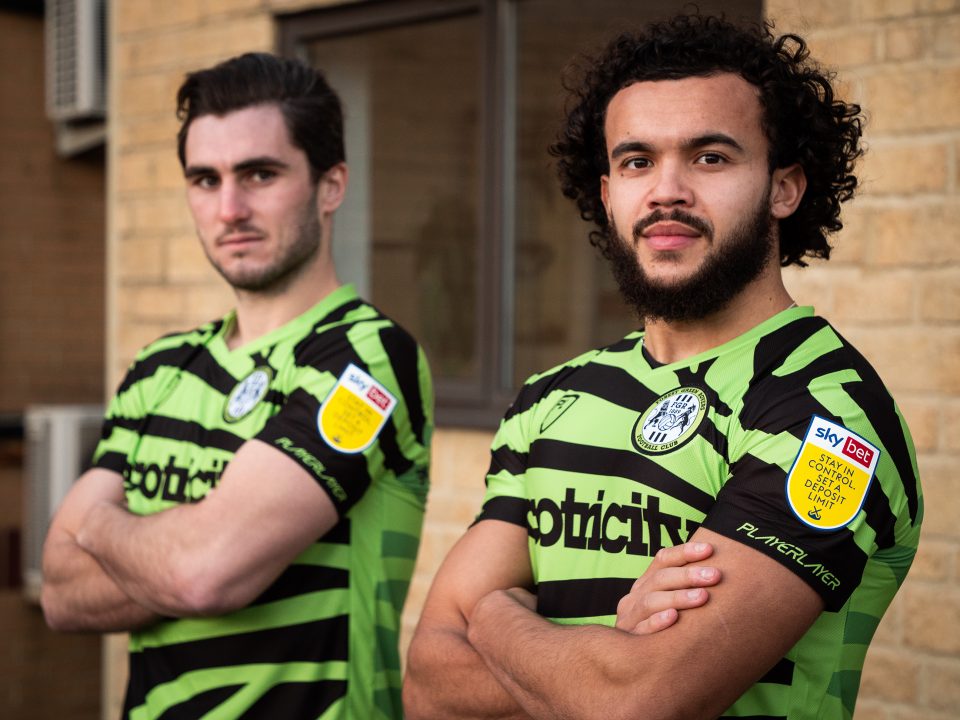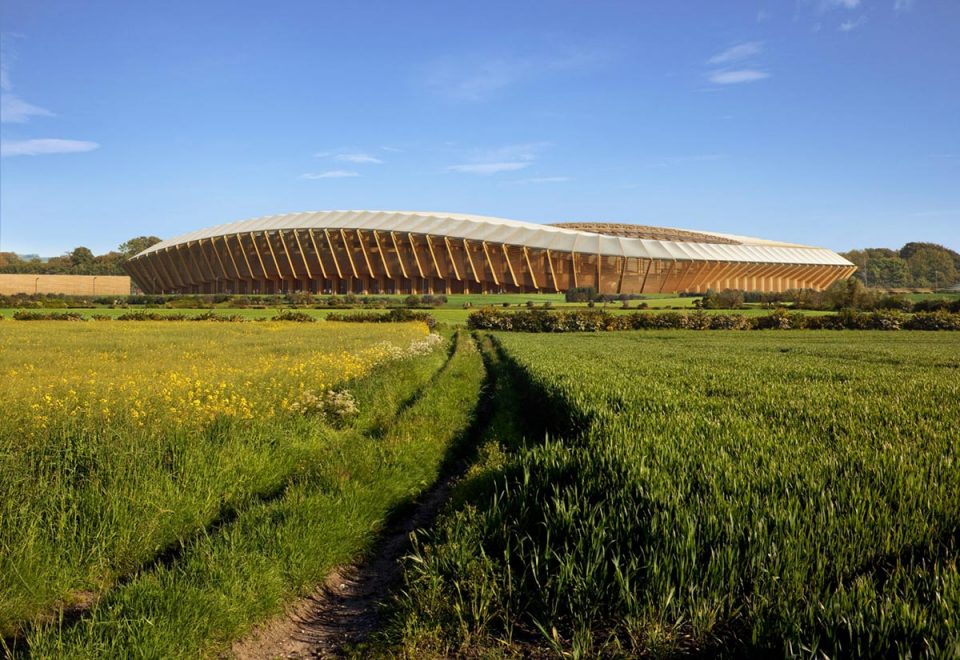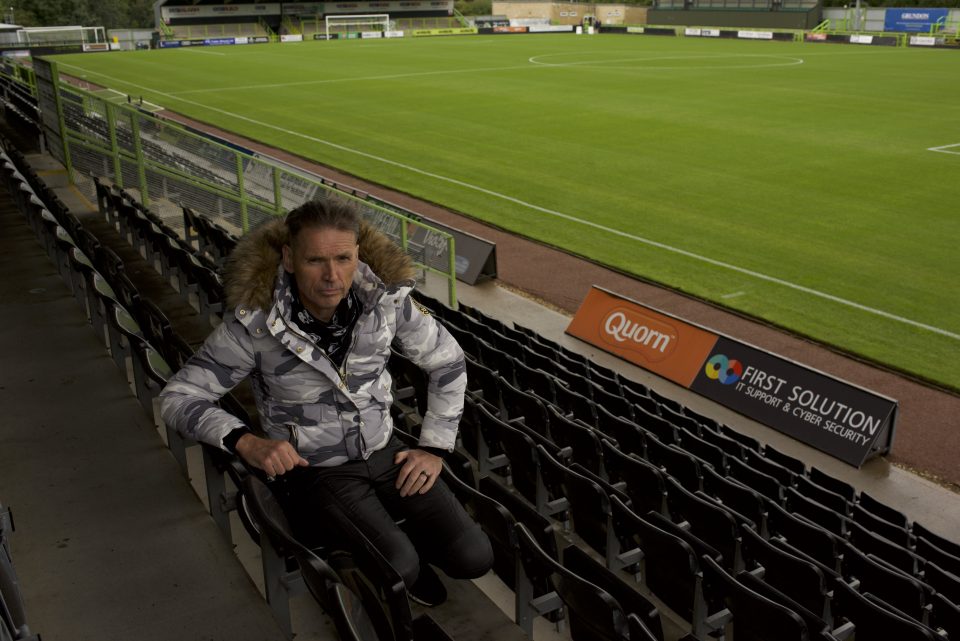Dale Vince interview: Forest Green Rovers chairman and green energy tycoon on climbing the football leagues while saving the planet

With a large green Union Jack behind him and a casually dishevelled appearance, Dale Vince brings to mind the leader of some rebel republic when he appears on the Zoom call.
Being cast as a revolutionary is nothing new to Vince. In business, the former New Age Traveller has turned once-leftfield ideas about green energy into a £100m fortune with his company Ecotricity, been at war with Elon Musk over electric vehicles, and now has a side venture selling sustainable diamonds made from thin air.
More recently, the 59-year-old has challenged the blinkered orthodoxy of the football industry, where he has defied doubts that an eco-friendly agenda and on-field success can coexist at tiny Forest Green Rovers.
Like other rebel leaders, he is no fan of the current government, which he says has treated the game “exceptionally badly” during the pandemic.
“Every sector of our economy and society has had some form of government support. Even sport: rugby, horse racing, cricket. Football? Nah,” Vince tells City A.M.
“The government seems to have a problem with football, generally. I don’t know if it’s a Marcus Rashford thing, if he’s pissed them off. But I don’t think it is.
“£500m went in one month on Eat Out To Help Out; £1.5bn on the arts; hundreds of millions into other forms of sport. Zilch for football. You’ve got to ask why.”
Is it a class thing? “Maybe it is a class thing, yeah. The government was really keen for football to come back because it’s a big lift to the mood of the nation, but weren’t willing to lift a hand.”
‘Football has a responsibility’
Fortunately, Vince has made a career out of turning adversity into unlikely success.
Since saving Forest Green from bankruptcy in 2010, the East Anglia-born West Country resident has transformed his local football club into the world’s first vegan and carbon-neutral team, who play on an organic pitch in kits made of recycled coffee beans.
The team’s results have also had an overhaul. Forest Green have gone from dodging relegation from the Conference on a technicality to a historic leap into the English Football League (EFL). This season, they are on the brink of another promotion to the third tier.
The club from Nailsworth – pop: 6,000 – now has fan groups in 100 countries, is recognised for its climate work by the United Nations and counts eco-conscious Arsenal player Hector Bellerin as a minority shareholder.
“It’s an incredible place to be 10 years after rescuing a local football club,” Vince says. “I’ve got a wild imagination, but I didn’t see that coming.”

Vince’s mission at Forest Green was “to get sports fans around the world to change the way they live to try to tackle the climate crisis”.
He says more of the club’s players each year adopt vegan diets at home. Supporters have bought into the message, too.
“They’re buying electric cars, solar panels – one guy has done all of that and he has got batteries for his house. That’s more than I’ve got!”
The club’s steadily improving results, meanwhile, have dispelled the myth that on-field success and a wider social purpose are uneasy bedfellows.
“These aren’t incompatible things,” he says. “People said to us: ‘What’s this got to do with football?’ My response is that football has a responsibility, actually.
“Football gets involved in racism, sexism and all these societal issues, quite rightly. The environment is arguably the biggest one we face and it’s right that we take a stand.”
Vince: Ahead of the curve but rejects ‘visionary’ tag
Vince revels in challenging the prevailing thinking; in fact, his appetite for going against the grain is like a renewable energy all of his own.
He despairs at the “stuffy” dress code imposed in football boardrooms, saying: “It’s like, FFS.”
When he launched a green campaign with a newspaper, it was the Daily Express, a previously climate change-sceptic publication.
And, taking a position that literally no one has yet voiced, he declares himself to be “really enjoying fanless football”.
“I think I’ve liked it because it’s different,” he adds. “There’s less pressure on the referee without an angry group of fans shouting at everything.”

Vince believes his independence of thought has given him and Forest Green Rovers an edge, however, especially in recent months.
He saw what Covid-19 might mean for football and was quick to put the club into hibernation.
While rivals have battled to stay afloat, Forest Green will, he says, “land in the black”. “It’s not been a bad year.” Few can say that.
In football as in business, Vince seems to have a happy knack of getting a head of the curve. Don’t call him a visionary, though.
“Sometimes people say to me ‘you’ve been clever in business, you got in first’. It’s not like that at all,” he says.
“I was just fortunate in that the things that I thought should happen have begun to happen.”
Twenty-six years after he started Ecotricity with a single wind turbine that he had been using to power his ex-Army truck home, society is catching up. But Vince still feels radical.
“I don’t think it’s radical in a scary way, it’s just that we can see the wood for the trees.”
Forest Green Rovers in the Premier League?
On Saturday, Forest Green play Cambridge United. Should they win, there is a good chance they will go top of League Two with 11 games to go.
Promotion would lift the club to a level currently occupied by the relative giants of Sunderland, Ipswich Town and Charlton Athletic, and put them within touching distance of Vince’s target, the Championship.
“We’re in the best place we’ve been,” he says. “Every year we try to improve incrementally. The idea is to move forwards sustainably – not in a boom and bust fashion – so that when we do get a promotion we are ready for it.”
Forest Green are laying the groundwork in the form of a striking new all-timber stadium designed by Zaha Hadid Architects.
The location of Eco Park, which will also incorporate a business park, was chosen for its ability to sustain Championship-level crowds of around 10,000 – double the capacity of their current home, The New Lawn.

However, an FA Cup trip last season to face Bournemouth, who survived in the Premier League on similar gates, has got Vince dreaming even bigger.
“It opened our eyes to the fact that it is conceivable to go further than the Championship,” he says.
“We are already the smallest club that’s ever been in the EFL [English Football League], and if we get to the Championship it would be an incredible achievement.
“We haven’t changed our official plan. But I hold it as a possibility in my mind that when we get there we may think this isn’t the end of the road actually.”
Diamonds, food, sewage and… politics?
Vince’s ambitions for Forest Green and Ecotricity are not the end of his road either.
There’s his sustainable diamonds business, a vegan food brand, Devil’s Kitchen, that supplies other football clubs, schools and is stocked by Ocado, and a compact sewage system currently in the research and development stage.
He is also, with a degree of reluctance, giving serious thought to entering politics.
The technology, the economic argument and a general will are in place to tackle climate change, he reasons, yet governments resist making the necessary tax adjustments.
“With some simple rule changes we could really drive this green revolution,” he says.
“I thought: maybe I should get involved in politics? I have to say it’s not an appealing industry to look at, but sometimes you’ve just got to do it.”
Dale Vince, the rebel leader of green energy, as prime minister?
“I doubt that very much. But I think I’d do a way better job than Boris Johnson.”
